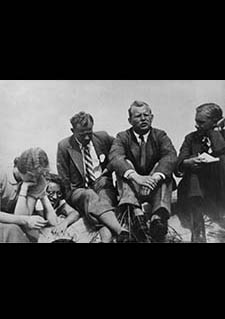Ecumenism: Between “Interference” and Cooperation
The “ecumenical movement” is a collective movement of Orthodox and Protestant churches (state, regional and free churches) in its larger sense that builds relationships and structures between churches, which – without the involvement of the Roman Catholic Church – led to the founding of the World Council of Churches (WCC) in August of 1948 in Amsterdam.
In the 1930s, the ecumenical movement was drawn into the clashes between the state and the German Evangelical Church (DEK) as well the conflicts between the wings of the Confessing Church.
By chance, international representatives of the ecumenical movement witnessed Hitler’s “seizure of power”. The executive committee of the World Alliance for Promoting International Friendship through the Churches met in Berlin on January 30, 1933 at the invitation of Hermann Kapler, President of the German Evangelical Church Committee. The administrative committee of the Life and Work movement convened on February 3 and 4. The two bodies thus held discussions in the midst of staged parades, displays of the flag and press campaigns. The political transition in Germany hardly would have gone unnoticed by any of the international guests.
The “Pastors’ Emergency League’s” foreign relations became a problem for the Nazi Regime primarily because it worried about the unsupervised dissemination of information on the state’s intervention in the church. Constant government monitoring and control of the church’s international contacts in particular were naturally also part of the understanding Nazi state with its totalitarian claim to power.
To pursue these interests, a “Church Foreign Office” headed by Theodor Heckel, a member of the High Consistory (given the title of bishop), was established (in February of 1934) in keeping with agreements between Hitler und Reich Bishop Ludwig Müller. Foreign churches were consequently notified that the Church Foreign Office was to be considered the sole point of contact for all of the church’s foreign relations from then on.
This measure made ecumenical (foreign) relations problematic for the ecumenical movement. The latter was inevitably forced to take sides: Should it continue to maintain contacts with the German Evangelical Church, even when it was headed by the German Christians? Or should it – despite instructions not to interfere in a church’s internal affairs – maintain and strengthen contacts with the Confessing Church, whose theological and ethical aims it knew it shared?
The new regulation of ecumenical contacts became a problem especially for the Confessing Church itself. On the one hand, the Swiss theologian Karl Barth, for instance, demanded that all ecumenical contacts to the Reich Church be broken off so as not to betray the Confessing Church. On the other hand, some representatives of the Confessing Church desired to maintain official contacts abroad, even by cooperating with government agencies (such as the Foreign Office) to an extent out of necessity. In 1934, this at least still appeared to have been possible.
The Confessing Church’s split over the issue of working together with the so-called “Reich Church Committee” intensified the problem. Every group attempted – some through official channels and others through personal connections – to lead ecumenical bodies according to their personal convictions.
In the first half of the 1930s, the ecumenical movement still lacked the stature to be able to speak with one voice. The initial inclination was therefore to stick to the official channel and allow contacts with the Protestant church to go through the Reich Church Committee.
Of course, this had consequences: Every trip abroad was contingent on the issuance of a visa, thus making it possible to exclude the “radical” representatives of the Confessing Church from the outset. In addition, “Bishop for Foreign Affairs” Heckel took advantage of ecumenical contacts to play down reports of arrests, torture and the anti-Jewish laws, which had caused dismay within the ecumenical movement.
Above all young Dietrich Bonhoeffer insisted that National Socialism should be viewed not (only) as an ethical but also as an out-and-out theological issue and National Socialism and Christianity should be regarded as fundamentally mutually exclusive.
In a letter of August 8, 1934, Bonhoeffer wrote Bishop Ove Valdemar Ammundsen that, particularly given our view of the state as well, there must be quite candid discussion for the sake of Jesus Christ and the ecumenical cause. It must become clear – as terrible as it is – that the decision is waiting at the gates: National Socialist or Christian (Goedeking, Bonhoeffer, 178). Bonhoeffer was however unable to get the ecumenical movement to follow the “Second Provisional Church Government’s” resolute course and its clear rejection of the Nazi regime.
Source / title
- © Bildarchiv Preussischer Kulturbesitz/Rotraut Forberg, Bildnummer 10006494 (Photograph/Agency: R. Forberg)

